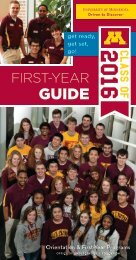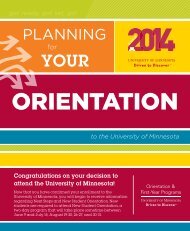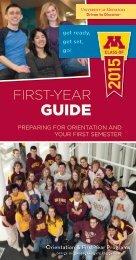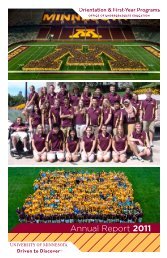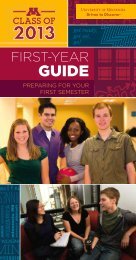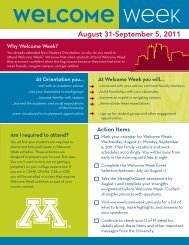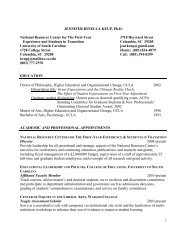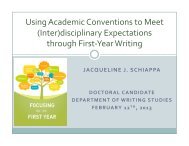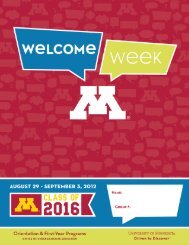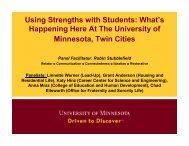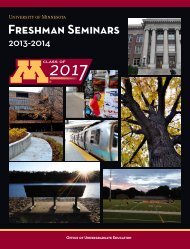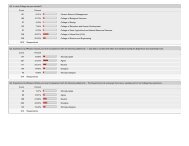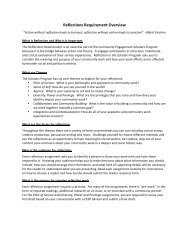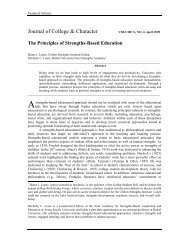Annual Report 2010 - Orientation and First-Year Programs ...
Annual Report 2010 - Orientation and First-Year Programs ...
Annual Report 2010 - Orientation and First-Year Programs ...
Create successful ePaper yourself
Turn your PDF publications into a flip-book with our unique Google optimized e-Paper software.
<strong>First</strong>-<strong>Year</strong> Assessment Plan<br />
The first-year (NHS) assessment plan continues to be implemented<br />
while collecting data from students at various points throughout<br />
their first year. The intent of this process provides data on student<br />
behavior related to the matriculation process, student satisfaction,<br />
student success both personally <strong>and</strong> academically, longitudinal data,<br />
<strong>and</strong> to measure the impact on student retention <strong>and</strong> other programs.<br />
The plan helps to inform the institution on the things we were<br />
learning about from our students <strong>and</strong> their experiences.<br />
Reference the presentation Preliminary Results from a Longitudinal<br />
Study of <strong>First</strong>-<strong>Year</strong> Students.<br />
Summary of Results<br />
• There is a positive relationship between students whose parents attend<br />
orientation <strong>and</strong> their success at the University – they do not leave their first<br />
year.<br />
• Since fall of 2008, there has been an increase in the number of students who<br />
have sought out a professional counselor, career counselor <strong>and</strong> faculty member<br />
for advice.<br />
• Students’ top five primary anxieties or concerns are academic coursework,<br />
making friends/meeting other people, financial concerns, deciding on a major/<br />
career path, <strong>and</strong> developing skills related to note-taking, studying, time<br />
management, stress management. For the first time this spring finding a job on<br />
campus rose into the top five.<br />
• Students are making greater connections with their Community Advisors,<br />
College advisors <strong>and</strong> staff, as well as faculty.<br />
• Students have a greater sense of connection to the community, to others who<br />
have similar interests <strong>and</strong> to the community through service.<br />
• There has been an increase in the number of students’ surveyed meeting with<br />
a University employee for advice or counseling. These include professional<br />
counselor, career counselor, faculty member, teaching assistant <strong>and</strong> Community<br />
Advisor.<br />
• More than one-third of the students who leave the University between fall <strong>and</strong><br />
spring semesters of their first year are from out of state.<br />
• Students who leave the University between fall <strong>and</strong> spring semesters of their<br />
first year leave for a variety of reasons including: financial issues, health issues,<br />
family issues, homesickness, campus is too big, difficulty making friends/<br />
connections, <strong>and</strong> other personal issues. A significant number of these students<br />
have a 3.1 GPA or higher.<br />
46



